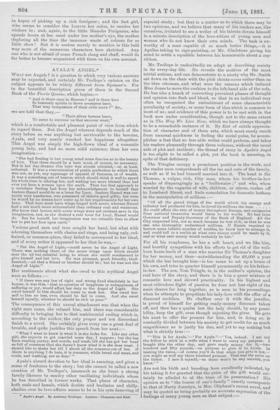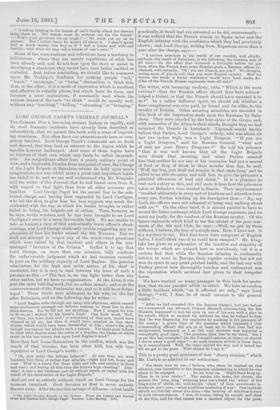AYALA'S ANGEL.* Wiria are Angels P is a question to
which very various answers may be expected, and certainly Mr. Trollope's opinion on the subject appears to be widely different from Spenser's. For in the beautiful description given of them in the Second Book of the Faerie Queene, which begins,— " And is there care in Heaven ? and is there love In heavenly spirits to these creatures bace, That may compassion of their evils move ?" 86c., cve are told that they,— " Their silver bowers leave, To come to succour us that succour want," which is a comfortable and pleasant point of view from which to regard them. But the Angel whereon depends much of the story before us was anything but serviceable to the heroine, Ayala, and very nearly wrecked her happiness altogether. This Angel was simply the high-flown ideal of a romantic young lady, and had no more solid existence than her own Imagination :— "She had floating in her young mind some fancies as to the beauty of love. That there should be a hero must, of course, be necessary. But in her day-dreams this hero was almost celestial,—or, at least, • a3thereal. It was a concentration of poetic perfection to which there was not, as yet, any appanage of apparel, of features, or of wealth. It was a something out of heaven which should think it well to spend his whole time in adoring her, and making her more blessed than had • ever yet been a woman upon the earth. Then her first approach to n mundane feeling had boon her acknowledgment to herself that Isadore Hamel would do as a lover for Lucy. Isadore Hamel was cer- tainly very handsome, was possessed of infinite good gifts; but even he would by no means have come up to her requirements for her own hero. That hero must have wings tinged with azure, whereas Hamel thud a not much more ;etherealised than ordinary coat and waistcoat. She knew that heroes with azure wings were not existent save in the imagination, and, as she desired a real lover for Lucy, Hamel would do. Bat for herself, her imagination was too valuable then to allow 'her to put her foot upon earth."
Various good men and true sought her hand, but what with .adorning themselves with chains and rings, and being ugly, red- 'haired, or common-place, they failed to correspond to her ideal, and of every suitor it appeared to her that he was,— " Not the Angel of Light,—could never be the Angel of Light. 'There was nothing there of the azure wings upon which should ,soar the all but celestial being to whom she could condescend to give herself and her love. He was pleasant, good, friendly, kind- hearted,—all that a friend or brother should be ; but he was not the Angel of Light."
Her sentiments about what she owed to this mythical Angel were as follows :—
"If there was any law of right and wrong fixed absolutely in her bosom, it was this,—that no question of happiness or unhappiness, of suffering or joy, would affect her duty to the Angel of Light. She owed herself to him should he come to seek her. She owed her- self to him no lees, even should he fail to come. And she owed 'herself equally, whether he should be rich or poor."
'The consequence of this unreal attachment was that when the right man came, she refused him, and there was considerable 'difficulty in bringing her to that matrimonial ending which is, according to the author, the only proper and not discordant 'finish to a novel. She certainly gives every one a great deal of trouble, and quite justifies this speech from her aunt :—
" What I want to know is what it is she looks for. Like any other girl, she expects to get married some day, I suppose; but she has been reading poetry, and novels, and trash, till she has got her head .,so full of nonsense that she doesn't know what it is she does want. I %should like to shake her till I shook all the romance out of her. If there is anything I do bate, it is romance, while bread and meat, and 'coals, and washing, are so dear.'"
Ayala's absurd devotion to her ideal is amusing, and gives a
sense of freshness to the story ; but she cannot be called a new creation of Mr. Trollope's, inasmuch as she bears a strong family likeness to sundry other vacillating individuals whom
lie has described in former works. That phase of character, both male and female, which doubts and hesitates and shilly- shallies over its love-affairs seems to be in his eyes deserving of
* .Asla'a ilugal. By Anthony Trollop°. London, Chapman and Hall.
especial study; but that is a matter as to which there may be two opinions, and we believe that many of his readers are, like ourselves, irritated to see a writer of his talents devote himself to a minute description of the love-whims of young men and women who do not know their own minds. The task is un- worthy of a man capable of so much better things,—it is Apelles taking to sign-painting, or Mr. Gladstone giving his
mind to settle a squabble between his housemaids about a cap- ribbon.
Mr. Trollope is undoubtedly an adept at describing society in its every-day life. He reveals the motives of the most trivial actions, and can demonstrate to a nicety why Mr. Smith sat down on the chair with the pink chintz-cover rather than on the blue ottoman, and what were the reasons which induced Miss Jones to move the cushion to the left-hand side of the sofa.
He has also a knack of converting prevalent phases of thought and opinion into flesh and blood, so that in an individual may often be recognised the embodiment of some characteristic peculiarity of society, or some form of idea which is common to
most of us ; and evidence of this power is to be met with in the book now under consideration, though not to the same extent
as in The Way We Live Now, which we have always thought to be a remarkable instance of it. By dint of subtle apprecia- tion of character and of these arts, which must surely result from unusual quickness in feeling the social pulse, he accom- plishes a feat that no less able writer could perform, and takes his readers pleasantly through three volumes, without the usual aids of plot and incident; the thread of story in Ayala's Angel is too slight to be called a plot, yet the book is amusing, in spite of that deficiency.
The Tringles occupy a prominent position in the work, and the reader soon comprehends all the ins and outs of the family, as well as if he had himself married into it. The head is Sir Thomas, a vulgar, rich, City man, whom his brother-in-law speaks of disparagingly as a " bullionaire ;" and who, when worried by the vagaries of wife, children, or nieces, rushes off to Lombard Street, and finds consolation for domestic bothers in the manipulation of millions :— "Of all the grand things of the world which his energy and industry had produced for him, he loved his millions the best He could affect the rate of money throughout Europe, and emissaries from national treasuries would listen to his words. He had been Governor and Deputy-Governor of the Bank of England. All the City respected him, not so much because he was rich, as that he was one who thoroughly understood millions. If Russia required to borrow some infinite number of roubles, he knew how to arrange it, and could toll to a rouble at what rate Money could be made by it, and at what rate money would certainly be lost."
For all his roughness, he has a soft heart, and we like him, and heartily sympathise with his efforts to get rid of the well- born horse-leech of a man who marries Sir Thomas's daughter for her money, and then—notwithstanding the 26,000 a year which she has brought him—is too mean to set up a house of his own, and tries to quarter himself permanently on his father- in-law. The son, Tom Tringle, is, in the author's opinion, the real hero of the story, and there is in him a queer mixture of romantic love and shrewd practicality. In his highest and.
most ridiculous flight of passion he does not lose sight of the main chance for long together, as is seen in his proceedings
when he attempts to propitiate his lady-love with the offer of a diamond necklace. He chaffers over it with the jeweller,
is proud of himself for getting ready-money discount taken off, and then has a qualm lest the lady should, by any possi- bility, keep the gift, even though rejecting the giver. He gets his aunt to offer the present for him, and, in doing so, is comically divided between his anxiety to get credit for as much magnificence as is justly his due, and yet to say nothing but what is strictly true:— " This is for Ayala.'—' For Ayala!'—' Yes, indeed. I am not the fellow to stick at a trifle when I want to carry my purpose. I bought this the other day, and gave ready money for it,—two hundred and fifty pounds,—on purpose to give it to Ayala. In naming the value,—of course you'll do that when you give it her,— you might as well say three hundred guineas. That was the price on the ticket. I saw it myself,—so there won't be any untruth, you know,'" Are not his birth and breeding here excellently indicated, by
his taking it for granted that the price of the gift would cer- tainly be alluded to at the time of its presentation ? His
opinion as to "the bosom of one's family" exactly corresponds to that of Harry Joscelyn, in Mrs. Oliphant 's recent novel, and may be quoted as being probably an accurate expression of the feelings of many young men on that subject :— "'I call an evening in the bosom of one's family about the slowest thing there is. The bosom must do without me for the future.' Won't your governor cut up rough P'—' He must out up as he pleases. But I rather fancy he knows all about it. I shan't spend half as much money this way as if I had a house and wife and family,—and what we may call a bosom of one's own.'" Some of the conversations and reflections have a tendency to tediousness ; whore they are merely repetitions of what has been already said, and do not bear upon the story or assist in developing a character, they would have been better omitted or, curtailed. And, before concluding, we should like to comment upon Mr. Trollope's fondness for making people "toll," " teach," "encourage," or " bring " themselves to think this, that, or the other ; it is a mode of expression which is excellent
and effective in suitable places, but which loses its force, and becomes a more mannerism, if constantly used where the
various tenses of the verb "to think" would do equally well, without any "teaching," "telling," "educating," or "bringing."

































 Previous page
Previous page